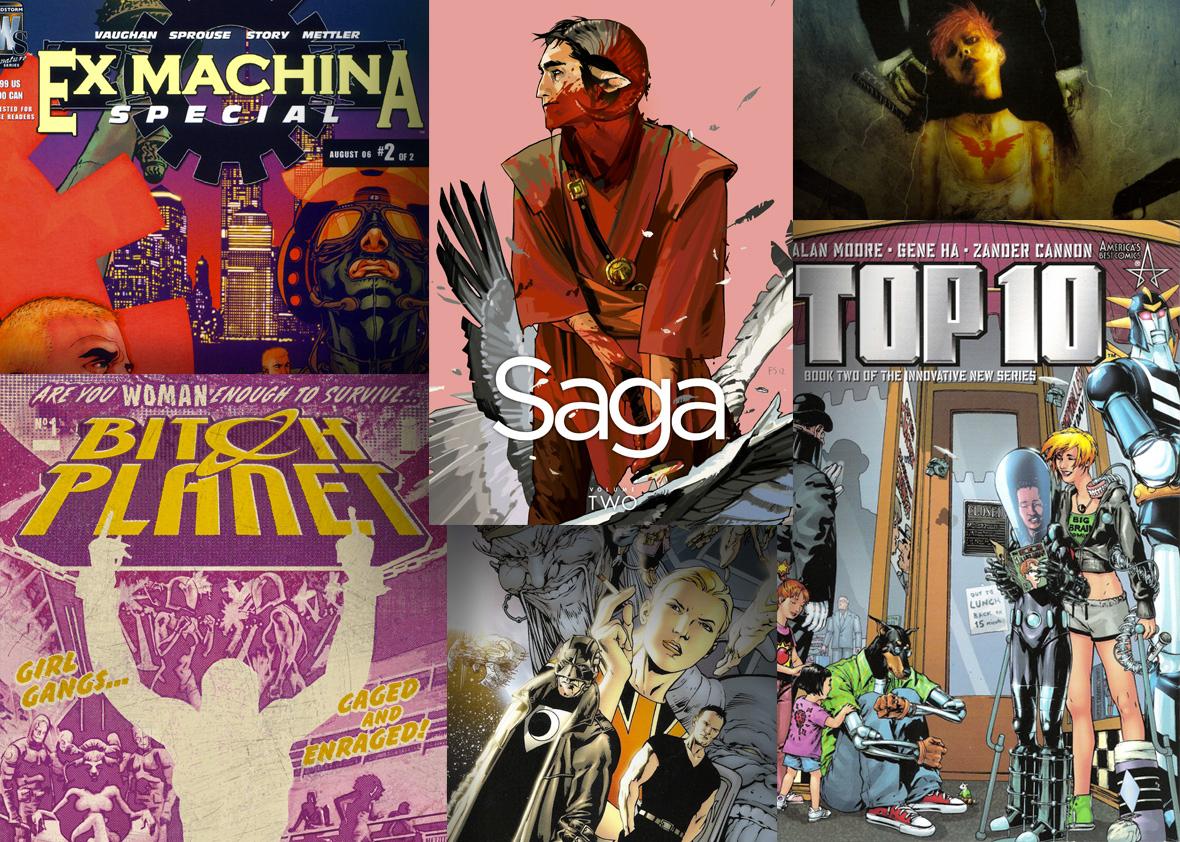The misfit superhero satire Deadpool demolished box office expectations over the long holiday weekend, bringing in $150 million from domestic theaters. As Box Office Mojo notes, this means that it broke numerous records, which surely came as a pleasant surprise to fans disappointed by the title character’s exceedingly lame cameo in the little loved X-Men Origins: Wolverine.
Not everyone’s happy with the character, though: Slate’s Jeffrey Bloomer, for example, complains that the film turns the comic book antihero’s pansexuality into a fratty gay panic joke. But the very fact that we can have such conversations about a monster hit like Deadpool suggests that there may be room for more—and maybe more extreme—comic book adaptations that have previously been considered too much of a risk for blockbuster-level capital. If nothing else, Deadpool’s success suggests that there’s room for plenty more of its kind.
Here, then, are six R-rated comics series that Hollywood executives might want to consider adapting next if they’re hoping to capitalize on the success of Deadpool. Sure, the resulting films will probably be heartbreaking garbage—as such adaptations almost inevitably are—but at least they’ll bring further attention to some worthy works, and introduce the world to some much-loved misfits.
The Authority by Warren Ellis and Bryan Hitch
In the mid-90s, superhero comics were in a rut, desperate to be hardcore, but unable to commit to their tough guy premises without devolving into adolescent nonsense. The Authority offered a stirring, and sometimes sickening, antidote, with a team of superheroes who set out to actually make the world safer for once—by murdering everyone who got in their way. There are plenty of reasons why superheroes don’t kill, but The Authority throws them out the window. With details like out and proud Batman and Superman analogues, this series upends the repressed stuffiness of most superhero comics, while still remaining recognizably of its genre. –Jacob Brogan
Ex Machina by Brian K. Vaughan and Tony Harris
Not to be confused with the movie also called Ex Machina, this Ex Machina starts off as an average superhero saga: After being exposed to a blast, Mitchell Hundred is able to communicate with machines, and as a masked avenger he tries to save the city as best he can. But in the wake of 9/11, Hundred decides to take his crusade one step further by becoming mayor of New York City—using his abilities to rule the most powerful town on earth. What follows is a stunning mix of urban mayhem, hot-button policy issues, and Sorkin-esque political intrigue, all grounded in New York’s history, as well as the real-world terrorism threat of 21st century America. The Great Machine proves to be the kind of franchise-worthy character from whom it’s impossible to avert your eyes. –Chelsea Hassler
Top 10 by Alan Moore, Gene Ha, and Zander Cannon
From a certain perspective, Top 10 is a police procedural, but it’s one that takes place in a city where everyone has superpowers. After a boom in the mid 20th century, Neopolis is facing a massive recession, and the planet is full of out-of-work metahumans who can’t help but turn to crime to earn a living. The series is outrageously sexy and brutally violent—True Detective gave it a shout out in the finale—but it also folds in modern struggles with prejudice, injustice, and the demands of social conformity. Mashing up Law & Order with writer Alan Moore’s earlier Watchmen, the rich characters and solid plotlines combined with an incredibly visual aesthetic makes the series ripe for adaptation to the big screen. –Chelsea Hassler
Bitch Planet by Kelly Sue DeConnick and Valentine DeLandro
In a dystopian near-future, all women who disobey the rules of the patriarchy are labeled “non-compliant” and sent to The Auxiliary Compliance Outpost, a galactic prison colloquially known as Bitch Planet. Kelly Sue DeConnick and Valentine DeLandro turn this time-worn exploitation narrative on its head, creating a universe in which strong, spunky women fight to take back the power and break the cycle of injustice. Flawed, deformed, and often terrifying, these aren’t your standard superheroines—but that’s what makes the series at once unique and loveable. Dozens of women went out and got themselves non-compliant tattoos after reading the series last year, a testament to the series’ resonance. The feminist agenda is alive and well in Bitch Planet, and it’s far overdue for a true Hollywood treatment. –Chelsea Hassler
Saga by Brian K. Vaughan and Fiona Staples
Saga follows the forbidden love of Alana and Marko, refugees from an interstellar war between their respective peoples. Desperate to protect their child, they travel from one world to the next, meeting, befriending, and sometimes fighting a host of bizarre characters wherever they go. Assembled from a grab bag of genre components, Saga is a bit like Star Wars for people who wish George Lucas had a filthier mind. –Jacob Brogan
Wormwood: Gentleman Corpse by Ben Templesmith
Meet Wormwood, a sentient, godlike slug-thing that burrows into and controls nattily dressed dead bodies, the better to help stave off apocalyptic portents and other forms of supernatural nonsense. Deftly self-aware—but not quite as smug about it as Deadpool—Wormwood deals in a delightful brand of horror comedy. Though Ben Templesmith is probably best known for illustrating the vampire saga 30 Days of Night (adapted into a forgettable Josh Hartnett vehicle), his work here is far more charming, and far sillier. He’s not the first to play Lovecraftian tropes for laughs, but his version just might be the one that works onscreen. –Jacob Brogan
